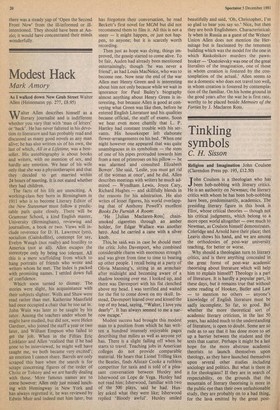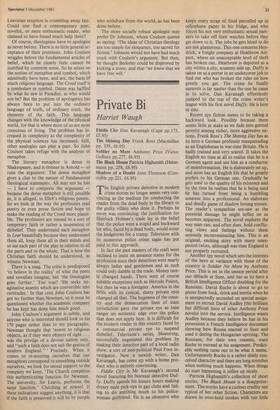Tinkling symbols
C. H. Sisson Religion and Imagination John Coulson (Clarendon Press pp. 193, £12.50) John Coulson is a theologian who has been hob-nobbing with literary critics. He is an authority on Newman; the literary critics with whom he has been hob-nobbing have been, predominantly, academics. The presiding literary figure in this book is Eliot, whose critical theories — though not his critical judgments, which belong to a more open world altogether — owe much to Newman, as Coulson himself demonstrates. Coleridge and Arnold have their place; then Leavis shows his hand, and we are among the orthodoxies of post-war university teaching, for better or worse.
Why should a theologian turn to literary critics, and is there anything concealed in the great forest of post-war academic theorising about literature which will help him to explain himself? Theology is a part of literature. It is hardly a popular part, in these days, but it remains true that without some reading of Hooker, Butler and Law — to mention no others — anyone's knowledge of English literature must be sadly incomplete. So far, so good. But whether the more theoretical sort of academic literary criticism, in the last 50 years, has added much to the understanding of literature, is open to doubt. Some are so rude as to say that it has done more to set up a barrier between the student and the texts that matter. Perhaps it might be a last hope for the more abstruse academic theorists to launch themselves upon theology, as they have launched themselves upon several other studies including sociology and politics. But what is there in it for theologians? If they are in search of respectability, on the grounds that the mountain of literary theorising is more in the public eye than their own unfashionable study, they are probably on to a bad thing, for the lava emitted by the great post Leavisian eruption is crumbling away fast. Could one find a contemporary poet, novelist, or mere enthusiastic reader, who claimed to have found much help there?
Of course, theologians have to apologise as never before. There is so little general acceptance of their premisses. John Coulson wriggles before the fundamental articles of belief, which he clearly feels cannot be justified by common sense. So he seizes on the notion of metaphor and symbol, which admittedly have been, and are, the basis of much religious language. The Creed itself is a symbolum or symbol. Dante was baffled by what he saw in Paradise, as who would not be? But the problem of apologetics has always been to put into the ordinary language of truth, of ordinary truth, the elements of the faith. This language changes with the knowledge of the physical world, for that is where most of us are most conscious of living. The problem has increased in complexity as the complexity of the physical sciences has increased. Still, other analogies can play a part. So John Coulson takes refuge with the analysts of metaphor.
The literary metaphor is dense in Shakespeare, and is thinner in Arnold — so runs the argument. The dense metaphor gives a clue to the nature of fundamental theological statements. All may not be lost — I have to compress the argument — because the dense metaphor is still possible as, it is alleged, in Eliot's religious poems. So we look at the way the professors read poetry or even prose fiction and hope to make the reading of the Creed more plausible. The professors are roused to a sort of temporary faith or rather a suspension of disbelief. They understand each metaphor in Lear beautifully because they understand them all, keep them all in their minds and so see each part of the play in relation to all the parts and to the whole. That is how the Christian faith should be understood, as witness Newman.
There is a snag. The critic is predisposed 'to believe in the reality' of what the poets and novelists imagine, but 'the theologian goes further.' Too true! 'He seeks imaginative assents which are convertible into certitudes.' In that crux John Coulson has got no further than Newman, so it must be questioned whether the academic company he has kept has done him much good.
John Coulson's argument is subtle, and anyone who is interested should look to his 170 pages rather than to my paragraphs. Newman thought that 'assent to religious objects, as if they were objects of sight . . . was the privilge of a devout nation only, and "such a faith does not suit the genius of modern England." ' Precisely. When it comes to re-assuring ourselves that our metaphors correspond to something outside ourselves, we look for moral support to the company we keep. 'The Church completes this authenticating function for Newman. The university, for Leavis, performs the same function.' Clutching at straws! If these indications suggest anything, it is that if the faith is preserved it will be by people who withdraw from the world,.as has been done before.
The more socially robust apologist may prefer Dr Johnson, whom Coulson quotes as saying: 'The ideas of Christian, theology are too simple for eloquence, too sacred for fiction.' Johnson would not have had much truck with Coulson's argument. But then, he thought Berkeley could be disproved by kicking a stone, and that 'we know that we have free will.'











































 Previous page
Previous page